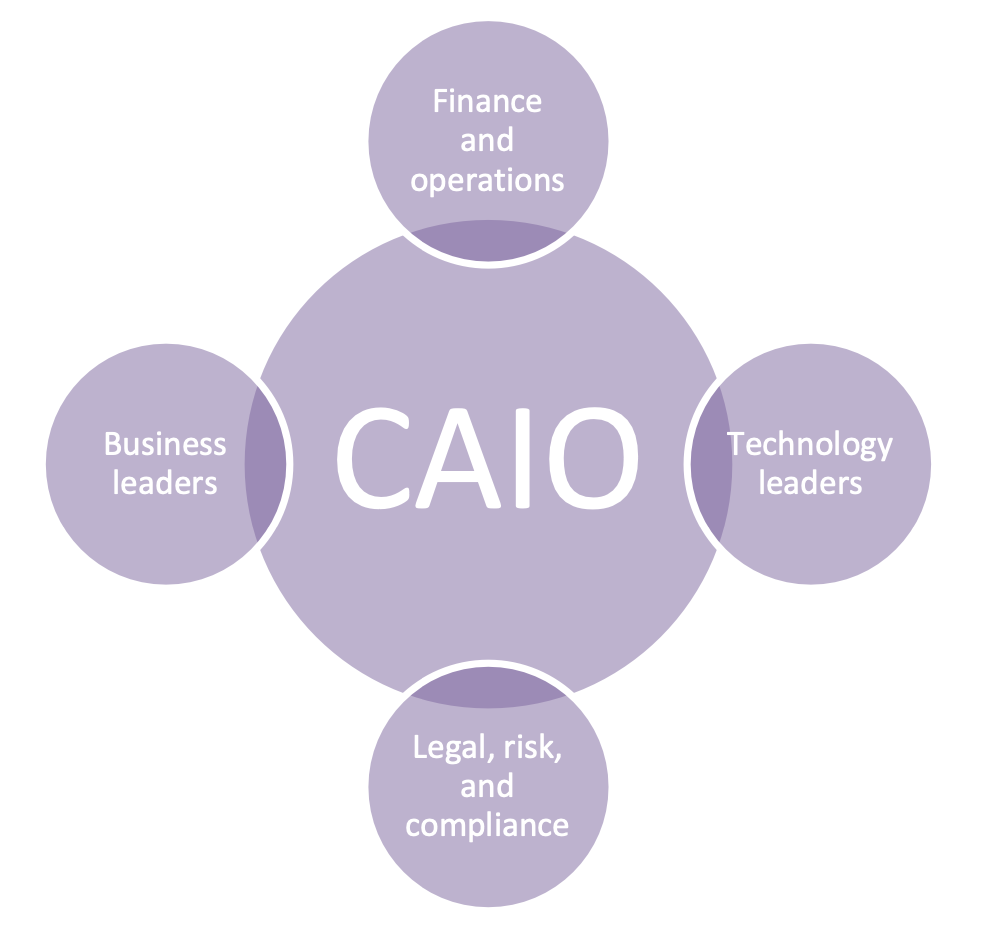Executive Summary
With artificial intelligence (AI) projects all the rage, organizations must make a strategic determination to create a new CxO role at least at a functional level if not at a title level.. This decision should not be made lightly, however. Although the chief AI officer (CAIO) role is critical to an organization’s success, the level of collaboration across business, IT, finance and operations, HR, and legal risk and compliance requires an unprecedented level of cooperation and orchestration. Boards will also want to consider AI at the same level as CyberSecurity.
After speaking with two dozen CAIOs, Constellation expects the role to be different across organizations and ultimately infused into all aspects of the business by 2026. As the AI field accelerates, organizations that fail to create the CAIO role will be left behind.
Enter the CAIO
The case for a CAIO is simple. AI is still immature; hasn’t been proven in most enterprise settings; and needs many surrounding acts such as security, privacy, governance, provenance, ethicality, and truthfulness before it can offer real value to enterprises. With great power comes great liability: Such is the case with AI. There is a lot of liability in using external tools as well as using decisions proposed by AI with full confidence in real-world applications. A single point of responsibility and accountability will ensure the right orchestration and collaboration across the organization.
Furthermore, organizations need a champion for AI, just as they did for digital transformation. In fact, the C-suite often is not fully aware of the complete AI capabilities, yet they are mesmerized by the possibilities. While improving operational efficiencies—whether in IT, customer support, help desk, incident management, or even bringing in additional revenues by launching innovative offerings—they are sold on the idea that their enterprise can be unique and can be the first. The viral popularization of ChatGPT makes them think AI is so easy that anyone can implement any solution in a matter of days, without realizing the liabilities and consequences to their organization.
A CAIO will balance the opportunities with the risks. For example, AI projects need standardized security, privacy, governance, auditing, legal, and risk management. There also needs to be a center of excellence that can coach the project participants to conduct the AI projects in the fastest and most efficient manner. In addition, a CAIO should be responsible for oversight, strategy, and vision.
Thus, there is a need for a CAIO that in some cases might report directly to the CEO but who will work closely with the technical as well as legal, corporate governance, board, finance, human resources, and other senior-level executives in the organization. These multitudes of requirements need to be under one umbrella and managed by a single responsible executive who will build the case for business necessity, create relevant use cases, assess outcomes, and determine ROI.
Consequently, every organization will need a CAIO to start the process, and eventually the CAIO role will be infused within the organization across business and technology units (see Figure 1)
Figure 1. CAIO Must Find Balance

Take The CAIO Survey
Understand what's next for CAIO's. Complete the survey and get the results!
Buy The Full Report
Boards Prioritizing AI Projects Above All Else in Many Organizations
The Case for a New Chief AI Officer (CAIO)
The Bottom Line: AI Will Be Infused Into All Aspects of the Business by 2026
Your POV
Who will be your CAIO? Will we end up with a Chief Digital, AI, Transformation, Technology, Information Officer?
Add your comments to the blog or reach me via email: R (at) ConstellationR (dot) com or R (at) SoftwareInsider (dot) org. Please let us know if you need help with your strategy efforts. Here’s how we can assist:
- Developing your AI, digital business, and experience strategy
- Connecting with other pioneers
- Sharing best practices
- Vendor selection
- Implementation partner selection
- Providing contract negotiations and software licensing support
- Demystifying software licensing
Reprints can be purchased through Constellation Research, Inc. To request official reprints in PDF format, please contact Sales.
Disclosures
Although we work closely with many mega software vendors, we want you to trust us. For the full disclosure policy,stay tuned for the full client list on the Constellation Research website. * Not responsible for any factual errors or omissions. However, happy to correct any errors upon email receipt.
Constellation Research recommends that readers consult a stock professional for their investment guidance. Investors should understand the potential conflicts of interest analysts might face. Constellation does not underwrite or own the securities of the companies the analysts cover. Analysts themselves sometimes own stocks in the companies they cover—either directly or indirectly, such as through employee stock-purchase pools in which they and their colleagues participate. As a general matter, investors should not rely solely on an analyst’s recommendation when deciding whether to buy, hold, or sell a stock. Instead, they should also do their own research—such as reading the prospectus for new companies or for public companies, the quarterly and annual reports filed with the SEC—to confirm whether a particular investment is appropriate for them in light of their individual financial circumstances.
Copyright © 2001 – 2023 R Wang and Insider Associates, LLC All rights reserved.
Contact the Sales team to purchase this report on a a la carte basis or join the Constellation Executive Network



